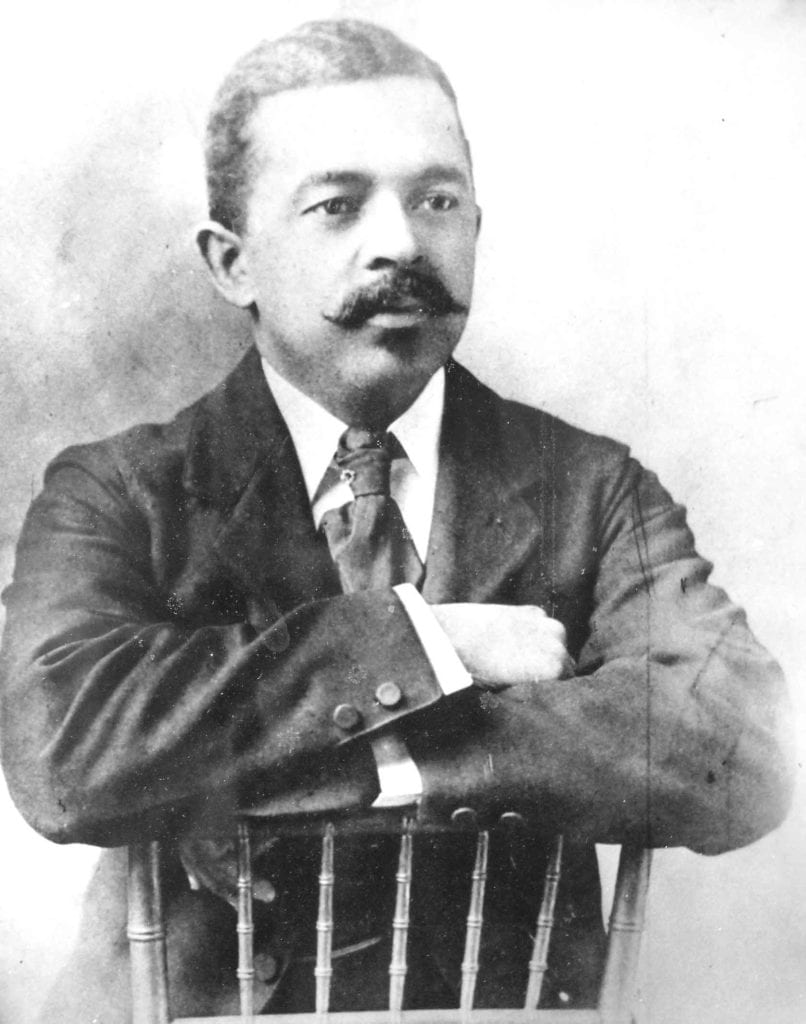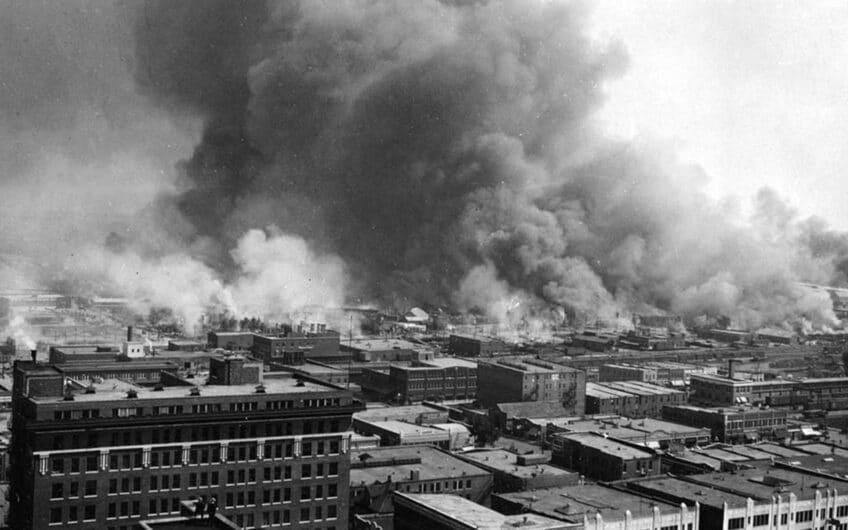
William Monroe Trotter considered his newspaper, the Guardian, to be in the abolitionist tradition. His idol was William Lloyd Garrison, editor of the Liberator, and leader of the abolitionist movement in the United States. Trotter kept a bust of Garrison on his desk. In 1908 when office space became available, Trotter opened the downtown offices of the Guardian in the same building on Cornhill which had once housed the Liberator.
Trotter’s dream was to form an effective Negro leadership with aggressive policies. By April of 1905, Trotter outlined to DuBois his plans for the Niagara Movement, “a national strategy board for defensive and offensive constructive action.” According to Trotter’s plans, “This would be a unique board. No white man… can pay expenses. That expenses paid is fatal to the Committee of 12. (Booker T. Washington’s Organization.)”
Thirty-one eminent African Americans responded to Trotter’s call for a national conference to form a radical organization with aggressive tactics. The conferees met in Fort Erie because they were denied hotel accommodations in Buffalo, N.Y. As a consequence, the organization because known as the Niagara Movement.
The radicals were in complete control over this movement. Their “Declaration of Principles” demanded that the Negro be integrated into all phases of American life, It requested the Christian Church in particular to assist the Negro in this fight, and it protested against the notion that “…the Negro American assents to inferiority, is submissive under oppression and apologetic before insults …We do not hesitate to complain …. To ignore, overlook, or apologize for these wrongs is to prove ourselves unworthy of freedom. Persistent, manly agitation is the way to liberty and toward this goal the Niagara Movement has started and asks the cooperation of all men of all races.”
The Niagara Movement generated much discussion, created much news, but accomplished little. It was disbanded in 1910.
Ostensibly the movement failed because of bad organization and limited funds. In fact, however, the clash between Du Bois and Trotter hastened its death. Du Bois and Trotter fought over appointments. They disagreed on ways to implement policies. But the issue which created the greatest hostility between the two men was that Du Bois wanted to admit white men into the organization. Trotter left the movement in disgust.
The Springfield, Illinois race riot of 1908 resulted in the lynching of several Negroes and caused many civil rights leaders to reconsider their present strategy. In May of 1909, Oswald Garrison Villard, son of the abolitionist leader, called a conference in New York. Six whites and six Negroes attended the two day conference. Trotter was the one Boston radical at the proceedings.
Trotter had no influence at the conference. His views were ignored and his name rejected as a possible officer of the organization. It seems that Villard considered Trotter to be too stubborn in his ideas. Trotter disassociated himself from this group.
In May of 1910, the Committee of Forty, as the group became named, became the National Association for the Advancement of Colored People. DuBois was the only Negro office holder in the Association. He was editor of the Crisis, the NAACP’s official publication.
Trotter, who was embittered by the 1909 conference, claimed that the white domination of the NAACP proved the necessity for an all-black organization.
Trotter had been defeated by Booker T. Washington and now he was disappointed by W.E.B. DuBois. Only the most committed of the Boston Radicals followed his leadership now. The Guardian’s circulation fell abruptly, and Trotter was forced to sell his property to keep the paper going. He and Deenie moved from their comfortable home into cheap apartments and rooming houses.
Trotter wrote to a friend in 1913, “The Guardian is precarious. That had been (its) condition for several years… Principle robs it of much money (yet) I had rather have people criticize my poverty than get money against my principles. No do I care how much they carp about money. The Guardian is run solely for the Colored people.”
He admitted that his refusal to carry liquor ads hurt the paper. Yet Trotter believed that the lack of support from his people were more to blame for the financial difficulties of the Guardian. “The Colored people,” he said, “…will be weak just as long as they remain too selfish or unintelligent to donate to such a paper as the Guardian as an instrument for their welfare… The Colored people are interior to all other people in refusing to contribute to definite agitation against the deprivation of all rights… The fight means nothing if one man pays the bills.”
Despite frustration with his people, Trotter continued to agitate and speak out for their rights. In April, 1915 D.W. Griffith’s film, “Birth of a Nation” appeared in Boston. The film was adapted from the novel, “The Clansman” by Thomas Dixon, a white supermacist. “Birth of a Nation” was the most technically advanced movie of the day, and was an immediate success throughout the country. Even Woodrow Wilson had written to Dixon, commending his book.
The film was an affront to Negroes. Throughout the movie, Negroes were shown as pleasure loving, lazy and lustful creatures, with the mental capacities of children.
Trotter requested that Mayor James M. Curley ban the film. When the mayor refused, Trotter claimed that he had been bought off, and he and his followers took to the streets. In the act of “manly agitation,” Trotter and ten of his followers were arrested for disorderly conduct at the Tremont Street Theatre. Many fights between Negroes and whites in Boston followed this incident. Further demonstrations were held.
On May 21st a new censorship law was passsed. The show was not closed, but rather its most flagrant anti-Negro scenes were cut. However, the racism implicit in the film remained.
Trotter renewed his efforts, and Negroes all over the country, including Booker T., rallied to his support. In August the film left Boston and was thereafter unofficially banned in the city.
On the political front, Trotter maintained a constant vigil over the rights of Negroes. No politician was too great to be protected from his barbed criticisms. Neither Henry Cabot Lodge nor presidents Theodore Roosevelt, William Taft or Woodrow Wilson were spared. Taft was outrightly, Trotter said, “a foe of the Negro race.” And he personally called President Wilson a “hypocrite.”
This personal confrontation with President Wilson was another sensational Trotter attack on segregation. Trotter’s purpose was to protest to Wilson against his policy of “concentration” of Negroes in Federal civil service positions. After Trotter’s angry visit to the White House, Wilson’s refusal to reverse the growing racial segregation in federal employment became well known. Trotter was hailed as a public hero for exposing Wilson.
Monroe Trotter became an international figure when he went to France to represent the American Negro at the Paris Peace Conference in 1919. Unable to finance his passage, Trotter shipped out as second cook aboard a European-bound freighter. He jumped ship in France and headed toward Paris. Although he was not officially recognized at the conference, he made quite a stir in the European press by circulating race petitions to the assemblage.
Within a few days of his return from Europe, Trotter’s mother died. Just one year before, Trotter’s wife “Deenie” had died of pneumonia. For years afterwards the Guardian’s editorial column would be prefaced by Deenie’s protrait with an inscription beginning, “To my fallen comrade …”
And such she was. Deenie was Trotter’s wife, coworker and principal supporter. She was uncomplaining, unselfish, and dedicated to her husband. Her loyalty to Trotter was unshakable despite the fact that she had none of the things women usually seek: children, a fine home, clothes, and an active social life.
Trotter diminished his activities during the ’20s. His vigilance on behalf of his people continued, but not on as broad a scale as before. He led a successful campaign against segregated dormitories at Harvard in 1923. Later he opposed a powerful group of Negroes and whites and prevented the establishment of an all-Negro hospital in Boston. But his most challenging task was to keep the Guardian on the streets. His only assistance was from his sister Maude and her husband Dr. Steward.
The depression severely hurt the Guardian. Trotter was terribly overworked trying to keep the paper going. Dr. Steward said that during this period, Trotter’s health began to fail. He began losing his sight, and “he constantly kept bumping into things.”
On Saturday morning, April 7, 1934, as was his custom, Trotter went to the roof of his apartment building on Cunard Street to pace and plan. It was his 62nd birthday.
His landlady later found him on the sidewalk below, a piece of drainpipe clutched in a death grip.
People from all over the country came to his funeral. A court in the Lenox Street Public Housing Project was named after him. The honors were few.
Maude Steward, Trotter’s sister, and her husband Dr. Charles G. Steward, continued publishing the Guardian until her death in 1957. Charles Steward continued to work out of newspaper’s office through the mid-1960s answering correspondence and sitting amid the relics of a life lived in honesty.
Kelley Miller, in his tribute to “The Noblest Roman of them all” stated:
“Monroe Trotter died a martyr to his race. I have known every agitator for racial rights who has stood out conspicuously for the past 40 years. Trotter stands out as the unrivalled and unmatched leader of his generation. He was not a radical but a courageous agitator for Constitutional and guaranteed rights. He sought no change in existing law nor the overthrow of existing order. His mission was not to destroy but to fulfill.
“Son of a distinguished father, a Harvard graduate with high academic rank, endowed with a comfortable patrimony, he allowed neither family nor school nor wealth to separate him from the love of race and devotion to its welfare.
“Others have had nothing to sacrifice but have gained honor, place and fortune out of the causes they espoused. Trotter is the only Negro, of my knowledge, who has made a sacrifice for his race.”
This article originally appeared in the Bay State Banner Oct 8, 1966.






